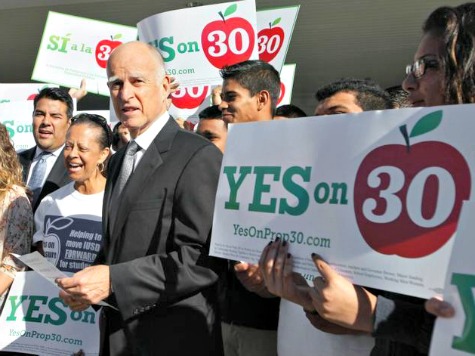California Democrats and public school advocates are eyeing the possibility of extending tax increases that were temporarily set into place in 2012, reports the Sacramento Bee.
Proposition 30, which has been estimated to have reaped over $13 billion for the state, increased the state sales tax and income taxes on California’s most successful earners, but is supposed to come to an end in two years. The Legislative Analyst’s Office believes state revenue will slow starting in 2016.
CA Governor Jerry Brown said in May of Prop 30, “That’s a temporary tax and, to the extent that I have anything to do with it, will remain temporary,” although he recently declined to commit to keeping the pledge he made in 2010 that he would not raise taxes without a public vote.
Before that, in January, Tom Torlakson, the state superintendent of public instruction, said he wanted Prop 30 extended. Last week, Sen. Mark Leno, chairman of the Joint Legislative Budget Committee, said he intends to consider a ballot measure along with interest groups to “see where they are with it and if I can be of any assistance.”
Leno argued:
I think this is so critically important to the future well-being of our state, and I’m speaking from a financial perspective – that means our investment in education, investment in our decimated court system, investment in our tattered social safety net – these are the things that are at risk if we don’t debate this and hopefully agree that this revenue is needed, in one form or another… We won’t have as potentially positive an opportunity until 2020.
Sen. Bob Huff, the Republican leader, countered, “These guys (Torlakson and Leno) start talking about this barely a year after implementation, so you have to be concerned, when you couple that with the governor… There’s always been a little background chatter about this. It was a giggle to say it was going to be temporary. And then the ink is barely dry, and they’re saying we’ve got to make it permanent.”
Torlakson and Leno are not alone; last September, Kevin McCarty, a Sacramento city councilman and Assembly candidate, said, “So I think that’s the first step, is re-upping Prop 30 in a few years… I think there should be a case to make it permanent.”
Joshua Pechthalt, president of the California Federation of Teachers, had said when Prop 30 passed that it was “only Step 1.” Last week, Pechthalt said the California Federation of Teachers will support a tax extension even without voter approval. He added that his union is “looking at various options for 2016. I think right now it’s at the level of informal chatter. It’s certainly on the minds of people in the classroom and people involved in public education.”
It’s anyone’s guess what the public would think of extending a tax increase; a PACE/USC Rossier School of Education poll taken last year showed roughly half of California voters support extending Prop 30, while one-third of voters want the proposition to expire. Dan Schnur, the director of the Jesse Unruh Institute of Politics at the University of Southern California, said, “Extending a tax is always a little bit less painful for voters than supporting a new one, but this would be a steep hill to climb. Brown was smart enough in the Prop 30 campaign to emphasize the temporary nature of the tax. It would be very difficult for him to come back (to voters).”
Jon Coupal, president of the Howard Jarvis Taxpayers Association, noted that there is more money in the state government now, and thus his case against extending Prop 30 is strengthened. He said, “We would have a lot of ammunition to counter anything on the ballot. The urgency that existed a couple years ago with Prop 30 and the education (issue) isn’t there.”
Leno wants a public vote; he said the legislature should “let the voters express an opinion on this.”
Assemblywoman Joan Buchanan said, “within the education community, people are talking about it, and it’s something that I hear consistently. There’s tremendous concern that when the temporary revenues expire, that we’re going to be right back to deep cuts in education.”

COMMENTS
Please let us know if you're having issues with commenting.